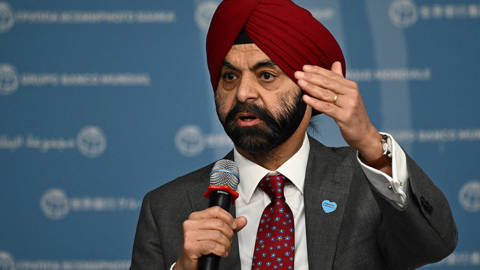Women’s rights are a global issue of the highest importance, and it is necessary to focus on the worst violations. Still, if having a family remains a career barrier for women, but not for men, that, too, is a matter of women’s rights.
PRINCETON – When I wrote the cover article of the July/August issue of The Atlantic, entitled “Why Women Still Can’t Have It All,” I expected a hostile reaction from many American career women of my generation and older, and positive reactions from women aged roughly 25-35. I expected that many men of that younger generation would also have strong reactions, given how many of them are trying to figure out how to be with their children, support their wives’ careers, and pursue their own plans.
I also expected to hear from business representatives about whether my proposed solutions – greater workplace flexibility, ending the culture of face-time and “time machismo,” and allowing parents who have been out of the workforce or working part-time to compete equally for top jobs once they re-enter – were feasible or utopian.
What I did not expect was the speed and scale of the reaction – almost a million readers within a week and far too many written responses and TV, radio, and blog debates for me to follow – and its global scope. I have conducted interviews with journalists in Britain, Germany, Norway, India, Australia, Japan, the Netherlands, and Brazil; and articles about the piece have been published in France, Ireland, Italy, Bolivia, Jamaica, Vietnam, Israel, Lebanon, Canada, and many other countries.
Reactions differ across countries, of course. Indeed, in many ways, the article is a litmus test of where individual countries are in their own evolution toward full equality for men and women. India and Britain, for example, have had strong women prime ministers in Indira Gandhi and Margaret Thatcher, but now must grapple with the “woman-as-man” archetype of female success.
The Scandinavian countries know that women around the world look to them as pioneers of social and economic policies that enable women to be mothers and successful career professionals, and that encourage and expect men to play an equal parenting role. But they are not producing as many women managers in the private sector as the United States is, much less at the top ranks.
The Germans are deeply conflicted. One major German magazine decided to frame my contribution to the debate as “career woman admits that it’s better to be home.” Another (more accurately) highlighted my emphasis on the need for deep social and economic change to allow women to have equal choices.
The French remain studiously aloof, even a little disdainful, as befits a nation that rejects “feminism” as an anti-feminine American creation and manages to produce a leader who is simultaneously as accomplished and as elegant as Christine Lagarde, the head of the International Monetary Fund. Of course, the example of her predecessor, Dominique Strauss-Kahn, and other stories about French male behavior that would count as clear sexual harassment in the stodgy US, suggest that perhaps a bit more feminisme a la Française is in order.
Beyond Europe, Japanese women lament how far they must still go in a relentlessly male and sexist culture. The Chinese now have a generation of educated, empowered young women who are not sure whether they want to marry at all, owing to the constraints that a husband (and a mother-in-law) would place on their freedom.
Brazilian women point with pride to their president, Dilma Rousseff, but also underscore how much discrimination remains. In Australia, with its robust work-life debate, women point to the success of Julia Gillard, the first woman prime minister, but note that she has no children (nor does German Chancellor Angela Merkel, the first woman to lead her country).
The global nature of this debate demonstrates at least three important lessons. First, if “soft power” means exercising influence because “others want what you want,” as Joseph Nye puts it, then women the world over want what American feminists began fighting for three generations ago.
Second, Americans, not surprisingly, have much to learn from other countries’ debates, laws, and cultural norms. After all, women have ascended the political ladder faster in many other countries than they have in the US. Indeed, the US has never had a woman president, Senate majority leader, Secretary of the Treasury, or Secretary of Defense.
Finally, these are not “women’s issues,” but social and economic issues. Societies that discover how to use the education and talent of half their populations, while allowing women and their partners to invest in their families, will have a competitive edge in the global knowledge/innovation economy.
Of course, hundreds of millions of women around the world can only wish that they had the problems about which I wrote. Last week brought news of yet another murder of a women’s rights activist in Pakistan; evidence that the Egyptian military may be deliberately using sexual assault to deter women from demonstrating in Cairo’s Tahrir Square; a horrific report from the New York-based Women’s Media Center about Syrian government forces’ use of sexual violence and gang rape; and a video of a Taliban commander brutally executing a woman for adultery as his fellow soldiers and villagers cheered.
Those are just the most extreme cases of physical violence that many women face. Worldwide, more than a billion women confront grinding and overt gender discrimination in education, nutrition, health care, and salaries.
Women’s rights are a global issue of the highest importance, and it is necessary to focus on the worst violations. Still, consider a recent matter-of-fact report from a sober and respected US magazine. In an article on “Women in Washington,” the National Journal observed that women in the US capital have come a long way, but “still face career barriers, and often the biggest one is having a family.”
If “having a family” is still a career barrier for women, but not for men, that, too, is a matter of women’s rights (and thus of human rights). In the global debate about work, family, and the promise of gender equality, no society is exempt.









PRINCETON – When I wrote the cover article of the July/August issue of The Atlantic, entitled “Why Women Still Can’t Have It All,” I expected a hostile reaction from many American career women of my generation and older, and positive reactions from women aged roughly 25-35. I expected that many men of that younger generation would also have strong reactions, given how many of them are trying to figure out how to be with their children, support their wives’ careers, and pursue their own plans.
I also expected to hear from business representatives about whether my proposed solutions – greater workplace flexibility, ending the culture of face-time and “time machismo,” and allowing parents who have been out of the workforce or working part-time to compete equally for top jobs once they re-enter – were feasible or utopian.
What I did not expect was the speed and scale of the reaction – almost a million readers within a week and far too many written responses and TV, radio, and blog debates for me to follow – and its global scope. I have conducted interviews with journalists in Britain, Germany, Norway, India, Australia, Japan, the Netherlands, and Brazil; and articles about the piece have been published in France, Ireland, Italy, Bolivia, Jamaica, Vietnam, Israel, Lebanon, Canada, and many other countries.
Reactions differ across countries, of course. Indeed, in many ways, the article is a litmus test of where individual countries are in their own evolution toward full equality for men and women. India and Britain, for example, have had strong women prime ministers in Indira Gandhi and Margaret Thatcher, but now must grapple with the “woman-as-man” archetype of female success.
The Scandinavian countries know that women around the world look to them as pioneers of social and economic policies that enable women to be mothers and successful career professionals, and that encourage and expect men to play an equal parenting role. But they are not producing as many women managers in the private sector as the United States is, much less at the top ranks.
The Germans are deeply conflicted. One major German magazine decided to frame my contribution to the debate as “career woman admits that it’s better to be home.” Another (more accurately) highlighted my emphasis on the need for deep social and economic change to allow women to have equal choices.
SPRING SALE: Save 40% on all new Digital or Digital Plus subscriptions
Subscribe now to gain greater access to Project Syndicate – including every commentary and our entire On Point suite of subscriber-exclusive content – starting at just $49.99.
Subscribe Now
The French remain studiously aloof, even a little disdainful, as befits a nation that rejects “feminism” as an anti-feminine American creation and manages to produce a leader who is simultaneously as accomplished and as elegant as Christine Lagarde, the head of the International Monetary Fund. Of course, the example of her predecessor, Dominique Strauss-Kahn, and other stories about French male behavior that would count as clear sexual harassment in the stodgy US, suggest that perhaps a bit more feminisme a la Française is in order.
Beyond Europe, Japanese women lament how far they must still go in a relentlessly male and sexist culture. The Chinese now have a generation of educated, empowered young women who are not sure whether they want to marry at all, owing to the constraints that a husband (and a mother-in-law) would place on their freedom.
Brazilian women point with pride to their president, Dilma Rousseff, but also underscore how much discrimination remains. In Australia, with its robust work-life debate, women point to the success of Julia Gillard, the first woman prime minister, but note that she has no children (nor does German Chancellor Angela Merkel, the first woman to lead her country).
The global nature of this debate demonstrates at least three important lessons. First, if “soft power” means exercising influence because “others want what you want,” as Joseph Nye puts it, then women the world over want what American feminists began fighting for three generations ago.
Second, Americans, not surprisingly, have much to learn from other countries’ debates, laws, and cultural norms. After all, women have ascended the political ladder faster in many other countries than they have in the US. Indeed, the US has never had a woman president, Senate majority leader, Secretary of the Treasury, or Secretary of Defense.
Finally, these are not “women’s issues,” but social and economic issues. Societies that discover how to use the education and talent of half their populations, while allowing women and their partners to invest in their families, will have a competitive edge in the global knowledge/innovation economy.
Of course, hundreds of millions of women around the world can only wish that they had the problems about which I wrote. Last week brought news of yet another murder of a women’s rights activist in Pakistan; evidence that the Egyptian military may be deliberately using sexual assault to deter women from demonstrating in Cairo’s Tahrir Square; a horrific report from the New York-based Women’s Media Center about Syrian government forces’ use of sexual violence and gang rape; and a video of a Taliban commander brutally executing a woman for adultery as his fellow soldiers and villagers cheered.
Those are just the most extreme cases of physical violence that many women face. Worldwide, more than a billion women confront grinding and overt gender discrimination in education, nutrition, health care, and salaries.
Women’s rights are a global issue of the highest importance, and it is necessary to focus on the worst violations. Still, consider a recent matter-of-fact report from a sober and respected US magazine. In an article on “Women in Washington,” the National Journal observed that women in the US capital have come a long way, but “still face career barriers, and often the biggest one is having a family.”
If “having a family” is still a career barrier for women, but not for men, that, too, is a matter of women’s rights (and thus of human rights). In the global debate about work, family, and the promise of gender equality, no society is exempt.